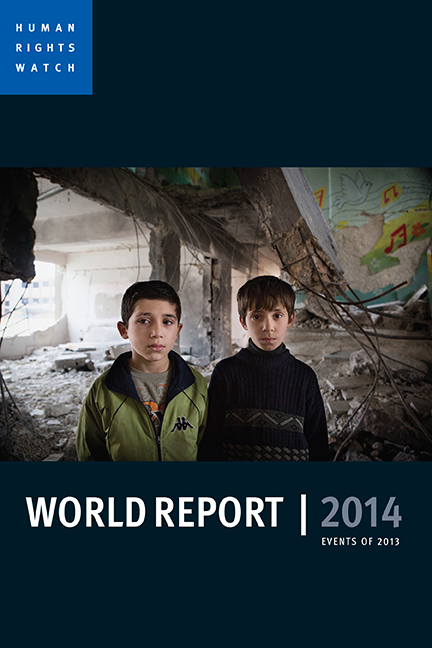Book contents
- Frontmatter
- Dedication
- HUMAN RIGHTS WATCH
- Table of Contents
- Foreword
- Rights Struggles of 2013: Stopping Mass Atrocities, Majority Bullying, and Abusive Counterterrorism
- The Human Rights Case for Drug Reform How Drug Criminalization Destroys Lives, Feeds Abuses, and Subverts the Rule of Law
- Putting Development to Rights: Integrating Rights into a Post-2015 Agenda
- The Right Whose Time Has Come (Again) Privacy in the Age of Surveillance
- Photo Essays
- AFRICA
- AMERICAS
- ASIA
- EUROPE AND CENTRAL ASIA
- MIDDLE EAST AND NORTH AFRICA
- UNITED STATES AND CANADA
- 2013 HUMAN RIGHTS WATCH PUBLICATIONS
- Acknowledgments
Morocco/Western Sahara
Published online by Cambridge University Press: 07 May 2022
- Frontmatter
- Dedication
- HUMAN RIGHTS WATCH
- Table of Contents
- Foreword
- Rights Struggles of 2013: Stopping Mass Atrocities, Majority Bullying, and Abusive Counterterrorism
- The Human Rights Case for Drug Reform How Drug Criminalization Destroys Lives, Feeds Abuses, and Subverts the Rule of Law
- Putting Development to Rights: Integrating Rights into a Post-2015 Agenda
- The Right Whose Time Has Come (Again) Privacy in the Age of Surveillance
- Photo Essays
- AFRICA
- AMERICAS
- ASIA
- EUROPE AND CENTRAL ASIA
- MIDDLE EAST AND NORTH AFRICA
- UNITED STATES AND CANADA
- 2013 HUMAN RIGHTS WATCH PUBLICATIONS
- Acknowledgments
Summary
Morocco's 2011 constitution incorporated strong human rights provisions, but these reforms did not lead to improved practices, the passage of implementing legislation, or the revision of repressive laws. In 2013, Moroccans exercised their right to peaceful protest in the streets, but police continued to violently disperse them on occasion. Laws that criminalize acts deemed harmful to the king, the monarchy, Islam, or Morocco's claim over the disputed Western Sahara limited the rights to peaceful expression, assembly, and association. In February, a military court sentenced 25 civilian Sahrawis to prison terms, including nine to life imprisonment. The trial was just one of many unfair trials in recent years that have resulted in politically motivated convictions.
Freedom of Expression
Independent print and online media continue to investigate and criticize government officials and policies, but face prosecution and harassment when they cross certain lines. The press law prescribes prison terms for “maliciously” spreading “false information” likely to disturb the public order, or for speech that is ruled defamatory.
Moroccan state television provides some room for debate and investigative reporting but little for direct criticism of the government or dissent on key issues. Authorities allowed Al Jazeera to resume operations in Morocco, having ordered it to shut its bureau in 2010 on account of its coverage of the dispute over the status of Western Sahara. On September 17, authorities arrested Ali Anouzla, director of the independent news site Lakome.com, because of an article describing, and providing an indirect link to, a militant Islamist recruitment video attacking King Mohammed VI. Released on October 25, he faced trial at time of writing on charges under the 2003 counterterrorism law, including “intentionally aiding those who perpetrate acts of terrorism.”
Abdessamad Haydour, a student, continued to serve a three -year prison term for insulting the king by calling him a “dog,” “a murderer,” and “a dictator” in a YouTube video. A court sentenced him in February 2012 under a penal code provision criminalizing “insults to the king.”
Freedom of Assembly
Moroccans have continued to hold marches and rallies to demand political reform and protest government actions since popular protests swept the region in February 2011. The police mostly allow these protests, but on some occasions in 2013 they attacked and severely beat protesters.
- Type
- Chapter
- Information
- World Report 2014Events of 2013, pp. 585 - 591Publisher: Bristol University PressPrint publication year: 2014

